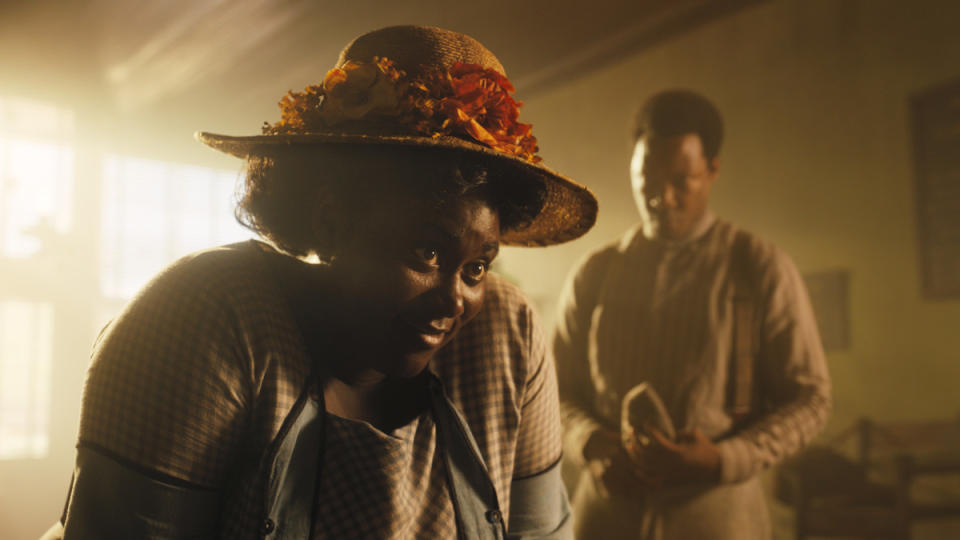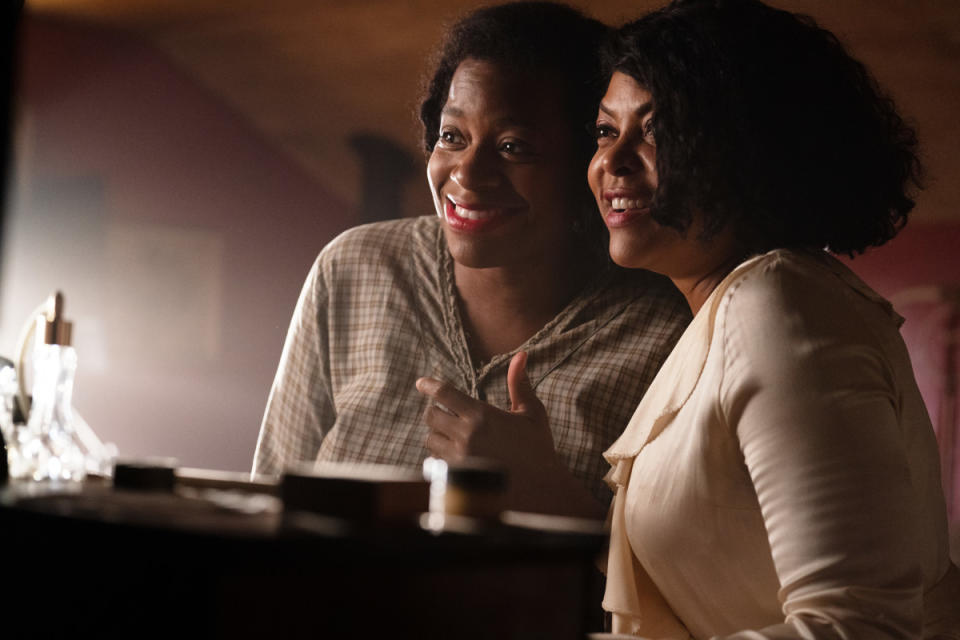'The Color Purple' Is One of the Year's Best Movies Because of Taraji P. Henson

The Color Purple
Taraji P. Henson is an actor with range. Find me another actor who could play Benjamin Button's adoptive mother aging forward while her child ages in reverse, meme-machine and hip hop queen Cookie Lyon AND Annie's Miss Hannigan. Henson has been stealing scenes across genres since the '90s with credits as diverse as Hustle & Flow (and the Oscar telecast performance of "It's Hard out Here for a Pimp"), The Karate Kid, Person of Interest, Hidden Figures and Abbot Elementary. And yet now, even after a Golden Globe, an Oscar nomination and six Emmy noms, Taraji is turning in the best work of her career as Shug Avery in The Color Purple.
The movie musical adaptation of Alice Walker's 1982 Pulitzer Prize-winning novel is just the latest in a series of the story's retellings. The novel was first adapted for the big screen in 1985 by Steven Spielberg into a movie that was nominated for 11 Oscars and somehow simultaneously discovered both Whoopi Goldberg and Oprah Winfrey. The book and movie were then adapted into a Broadway musical that opened in 2005 and ran until 2008, starring LaChanze and later American Idol Season 3 winner Fantasia Barrino. The musical was nominated for 11 Tony Awards and became such a massive success that it was opened in London in 2013 and then transferred back to Broadway in 2015 with Cynthia Erivo, Jennifer Hudson and Danielle Brooks, where it nabbed another four Tony nominations, a Grammy and an Emmy.
Related: Best Movies of 2023

Warner Bros.
Shortly after the Broadway revival's closing, rumors of a filmed version began to float around with the casting of the leads largely speculated to be culled from the stage ensemble. While Barrino and Brooks were tapped to play Celie and Sofia, however, the role of Shug Avery went to Henson, in one of the best pieces of casting this century.
The 2023 movie (along with the other iterations) follows Celie in a decades long coming-of-age saga that begins with her (played by Phylicia Pearl Mpasi as a young adult) and her sister Nettie (Halle Bailey) being separated when Celie is married off to the abusive Mister (Colman Domingo). As Celie grows up she meets Sofia, Mister's mouthy daughter-in-law with a penchant for getting in trouble and Shug Avery, a traveling singer and Mister's mistress. The Color Purple tells a story of the three women's liberation from the horrible men in their lives and resulting independence, although that doesn't come without plenty of setbacks. Sofia's marriage to Harpo (Corey Hawkins) sours and she's later thrown in prison during an altercation with a white woman. Celie endures constant abuse from Mister and his father all while making sure that his house is in immaculate shape. Shug, despite a thriving career and caring husband, mourns being estranged from her father, the local reverend (David Alan Grier).
While those lucky enough to see one of the staged adaptations will know this already, the injection of music into the plot of the novel and original film revolutionizes the tone of the story. Although the 2023 movie chops quite a few numbers from the stage musical and adds a few new ones to the mix, the music's purpose is the same: to bring joy to what can often be a fairly bleak tale. While The Color Purple ultimately has a happy ending, the 1985 movie version especially spends plenty of time watching tragedy and abuse befall Black women. The musical, while not shying away from those events, offers up a celebration of womanhood, sisterhood and Black community bolstered by music. From the opening performance of "Mysterious Ways" with the church congregation dancing in the streets to the closing song "The Color Purple" with the cast at a giant picnic, the musical numbers (and Fatima Robinson's energetic choreography) breathe so much life into the story.
Of course, those songs are only successful because of the vocalists behind them. As we've seen as recently as Wonka, there's only so much a ho-hum singer can do. Luckily, director Blitz Bazawule and his producers (that include Winfrey, Spielberg and Quincy Jones) prioritized singers when casting the movie, even managing to sneak musicians like H.E.R. and Ciara into an already star-studded cast.
Related: The Complete List of 2023 Oscar Winners

Warner Bros.
But this brings us back to Taraji P. Henson, who in the early awards conversations has been often overlooked in celebration of Barrino and Brooks' showier performances. Henson's Shug perhaps goes on less of a journey in the film and has fewer outbursts, but it's Shug who does so much of the heavy lifting. First, Henson so delicately balances Shug's bombastic show-woman persona with the caring, maternal instinct she displays in the quiet moments with Celie. Shug not only has to be someone who Celie idolizes and becomes infatuated with, but must also be Celie's biggest cheerleader and foundational support system. Henson is just as strong performing "Push Da Button" in a bar as she is wordlessly beaming the love into Celie that allows her to blossom.
Of course the discourse regarding Celie and Shug's lesbian relationship, and to what extent that should be downplayed or emphasized is endless, and while I wish their relationship had played a larger part in the story, Henson is a beautiful mirror, reflecting Celie's admiration back at her to create self-confidence. Fantasia's performance cannot be as strong as it is without Taraji there to work off of.
Shug is the glue that holds this story together and Taraji pulls out every trick in her bag to showcase the character's emotional depths. From her humor in the dining room scene and her empathy when Celie finds the letters to her bombastic showgirl persona on stage and her tender, mournful exchanges with her father, Henson delivers a masterclass in acting unlike one we've seen in recent memory. Throw her singing and dancing into the mix, and "Dear God" what more could you want?
The Color Purple is a complete and total success from start to finish, and manages to take what was already a classic story and make it better. From the beautiful lighting design and the vibrant choreography to the breathtaking vocals and ear-worm numbers (you'll be humming "I'm Here" for weeks), the movie does everything right. And while praise should certainly be lavished on everyone with a hand in this project, perhaps there should be a little bit extra for Taraji. I mean, she performed in that massive headpiece, goddammit!
Grade: A
Next, Academy Award Contenders for 2024 That You Can Already Watch
